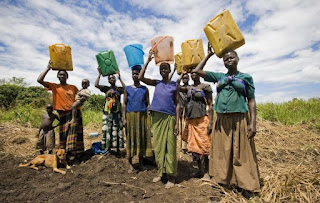“Strong as a dandelion” – A debrief of COP27 gender day
Today marks a week since gender day at COP27, which discussed 3 main points:
1. women are the most affected by climate change
2. women are essential to adapt and mitigate climate change effects
3. women need to be in climate leadership positions
These three points are increasingly relevant when discussing water and gender in Africa, and I will expand on all three of these in future posts.
COP27 is a united nation climate change conference that almost every country’s leaders attend to negotiate policies to mitigate climate change. This blog will focus on thematic gender day at COP27, a day that Sima Bahous, UN's women’s executive director, says is key to “recognise and augment how women and girls are bringing innovative climate actions and other solutions” (Women's Agender 2022).
Women bare the brunt … they can also play a crucial role - Amina Mohammed.
Clip of UN Deputy Secretary-General Amina Mohammed at a COP27 talk at 11.05 minutes (United Nations 2022a)
Above is a clip of Amina Mohammed, the UN deputy sectary-General, speaking at COP27 about women in Africa. This quote perfectly sums up the relationship between women and water in Africa by discussing how the loss and damages through climate change will have the greatest impact on women and how women are the key to “Mitigation, adaption and resilience” (Mohammed 2022 IN United Nations 2022a).
The loss and damages for women in Africa due to climate change have been a curial element of gender day, with the NGO ActionAid championing this. ActionAid released a report revealing that women will be disproportionally affected by climate change's direct and indirect impacts (United Nations 2022b. These effects include a higher risk of sexual assault and increased domestic violence. Throughout this report, it became evident that water stress is the catalyst for women's increased hardships. My future blogs will delve further into how women face the brunt of climate change due to changes in water distribution.
Thinking back to Amina Mohammed’s speech, she makes clear that women are the key to mitigation and adaption against climate change; this is echoed throughout COP27 as Lucy Ntongal, Kenyan climate and gender expert from ActionAid says that voices of women need to be put at the heart of negotiations as they are the ones “living through the realities of the climate crisis” as are the “best people to provide solutions” (United Nations 2022b). Alycia Leonard, from Energy Powe Group, further emphasise this at COP27 by suggesting that:
“Women are the beating heart of grassroots climate movements. They manage everything from families to ecosystems; it only makes sense that they are at the forefront in climate negotiations.” (University of Oxford 2022)
COP27 has put women in the global south as the solution for climate resilience at the forefront of gender day, and I hope to emphasise why women are paramount to mitigating and adaption when it comes to water in later blogs.
Where are all the women?
The last key topic that COP27 discussed is the idea that women need to be in leadership positions when tackling climate change. Throughout COP27, it is evident that women are missing from decision-making processes at all levels, even though they will be affected most by climate change. President of the National Council for Women in Egypt, Dr Maya Morsi, urged, "Women are not just helpless victims of climate change, they are powerful agents of change, and their leadership is critical” (OCHA 2022). Here she makes clear that women must be in leadership positions as they are essential to creating change. Her cries for women not to be seen as passive victims were reiterated by Mary Robinson, former president of Ireland and Member of the “elders’ group, who quotes “strong as a dandelion”, a metaphor showing how resilient women are and how their leadership is necessary to fully understand issues on the ground which is missing from man dominated climate talks (United Nations 2022b).
These inspiring women were just a few in a sea of men at COP27, making their plea for women in leadership even more relevant and necessary. To me, it just seemed a little ironic that COP27 has Gender day whilst women make up less than 34% of country negotiation teams at the summit (BBC 2022). This emphasises the paramount need for more women to be pushed into spaces like COP27 to have their voices heard.
“cop27 family photo”, with only 7 out of 110 people being women
Overall COP27s gender day raised some key issues surrounding women and water in Africa, paying key attention to the fact women will suffer disproportionally, are key to climate disaster mitigation and the need for women, especially those in the global south, to become leaders. But as the final paragraph makes disturbingly clear, we still have a long way to go for women at all levels to be leaders in climate solutions.




This was a really interesting blog post! It's clear from your blog that, given that women are so affected by climate change they must be included in policy-making discussions. How do you think female participation in conferences like COP27 could be improved in the future?
ReplyDeleteThank you for your comment! Interesting question, I definitely think firstly that there needs to be more women encouraged and empowered into speaking at these events, women from all different countries and backgrounds. To do this they need toovercome traditions and embedded social norms that don't allow women to be leaders. one way these local inequalities can be overcome is through speaking to men in the societies to change there mind on women traditional roles. it is essential that for full participation of every women empowerment from within there communities needs to occur.
Delete